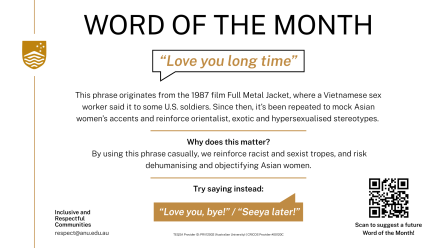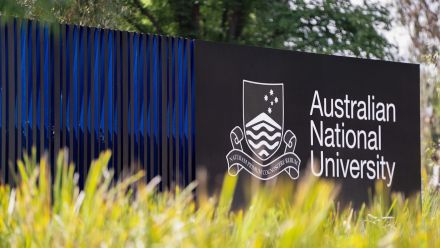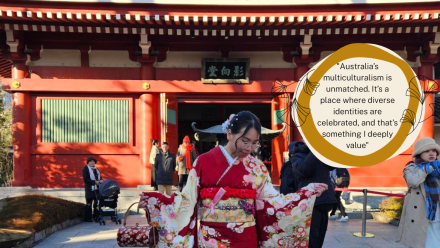Faces of ANU: Aron Harold Pamoso’s PhD Journey at ANU
My goal is to amplify their voices and expertise, shifting the narrative so they’re seen as experts of their own experiences.”
For many postgraduate students, the journey through higher education is a solitary path filled with rigorous research, long hours, and unique challenges. For Aron Harold Pamoso, a first-year PhD candidate in psychology at the Australian National University (ANU), this experience has been a transformative one, defined by his determination to build connections and create meaningful change.
Aron, an international student from the Philippines, is charting new territory in his academic and personal life. As someone who arrived in Canberra with no prior connections, Aron quickly recognized the isolating nature of postgraduate study. His reflections and resilience provide a guide for others navigating similar challenges.
Beyond the University Walls and Advice for Postgraduate Students
“I didn’t know anyone here in Australia,” Aron shares. “It was overwhelming—to be in a foreign country and to do such isolating work.” Unlike undergraduates, whose schedules often revolve around classes and peer interactions, Aron’s PhD life is marked by independent research, mentoring undergraduate students, and marking assignments. While fulfilling, this academic independence often creates a sense of isolation.
Recognizing the need for connection, Aron sought out ways to build community. He recently joined Meridian, a Canberra-based organization supporting the LGBTQIA+ community, which became a turning point for him. This involvement not only helped him find balance between his PhD responsibilities and personal life but also gave him a sense of belonging in a new city.
“Building community outside university is as important as building one within,” Aron explains. “It gives us balance and reminds us that there’s life beyond our research.”
For Aron and many postgraduate students, one of the most pressing challenges is maintaining mental health amidst the demands of academic work and the isolation it often brings. International students like Aron, far from family and familiar support systems, can be especially vulnerable to feelings of loneliness and stress.
“Talking about mental health openly is the first step,” he emphasizes. “Creating spaces where people can share their experiences without fear of judgment or stigma is crucial.”
Aron highlights initiatives like Australia’s R U OK? Day as valuable tools for fostering these conversations. “These events remind us to check in with one another. Even a simple question like, ‘How are you doing?’ can make a difference,” he says. For Aron, these conversations have been instrumental in his own life. He often leans on friends in Canberra and back home in the Philippines to navigate moments of stress.
“It’s important to have those people who truly listen, whether they’re nearby or far away,” Aron shares. “Opening up made a huge difference for me.”
Beyond community building, Aron encourages postgraduate students to explore shared interests as a way to bridge the gap between isolation and connection. “I started biking when I arrived in Canberra because the city is beautiful. It would be great to connect with other postgrad students who share similar passions, like biking. Shared activities help foster meaningful relationships,” he notes.
Aron underscores that balancing personal and academic life is not just about finding connections but also prioritizing mental well-being. “Talking about mental health is essential,” he says. “It’s important to create spaces where people can openly share their experiences without fear of judgment.”
Research with Purpose
Aron’s work extends beyond personal growth—it’s a mission to drive social justice. His PhD project explores how to promote health equity among gay and bisexual men, focusing on the broader LGBTQIA+ community. By leveraging lived experiences and community expertise, Aron aims to address health disparities and empower marginalized groups.
“I’m working closely with communities in the Philippines and Canberra to understand their challenges and co-create solutions,” he explains. “My goal is to amplify their voices and expertise, shifting the narrative so they’re seen as experts of their own experiences.”
Aron’s dedication is deeply rooted in his volunteer work back home, which revealed the pressing realities faced by marginalized communities. His research is not just an academic pursuit—it’s a passion project aimed at creating tangible social change.
Reflecting on his journey, Aron expresses profound gratitude for the opportunities at ANU. “Back home, resources for this kind of research are limited. I feel privileged to be here and to work on a project that aligns with my passion for social justice.”
Aron’s story is one of resilience, community building, and purpose-driven research. Grateful for the opportunities he’s found at ANU, Aron remains focused on the bigger picture: to contribute to a world where marginalized communities are no longer sidelined but celebrated and supported.
For Aron, the community brought him to Canberra, and now he’s determined to give back. Through his research, advocacy, and personal growth, Aron Harold Pamoso is paving the way for change—within ANU, in the broader LGBTQIA+ community, and beyond.


